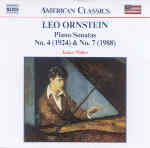Throughout his long compositional career Leo Ornstein (1892?-2002) wrote effective, fluid, and idiomatic piano music whose sheer creative and physical energy holds your attention yet leaves you wondering if you’ve heard these tunes, these harmonies, these textures before. Put on the opening selection, A Morning in the Woods, written in 1971 (when Ornstein was 81 or thereabouts, no one knows for sure) and A/B its lacey melodic threads and gentle chord voicings against Chick Corea’s rhapsodic solo improvisations. Then try to guess who’s who! As for the 1924 Fourth Piano Sonata, how did Debussy’s Claire de lune wind up in the first movement, or late Scriabin in the Lento? The final Vivo sounds like what might have happened had Scriabin rewritten Granados’ Goyescas. Age-of-steel Prokofiev motor rhythms, alkalized Ives outbursts, and snatches of guileless lyric beauty interweave throughout the Seventh Sonata–a rambling yet amazingly confident work for a 98-year-old! A Long Remembered Source, from 1964, is a free-floating fantasia in the key of Ravel. Interestingly, the earliest works (Danse Sauvage, Impressions of the Thames, and Suicide in an Airplane) seem the most modern in their determined pursuit of clusters and clatter.
The performances are simply breathtaking. Janice Weber’s super-proficiency feeds upon difficult, off-the-beaten-path piano repertoire. Her few recordings include a long-deleted ASV disc of Strauss waltz transcriptions, plus the disc premiere of Liszt’s Transcendental Etudes in their horrendously hard 1838 versions. She also participated in Ornstein’s meaty Piano Quintet, released by New World. Not surprisingly, Weber’s pliable hands reveal Ornstein’s elaborate textures in their most natural, effortless-sounding state, abetted by Naxos’ ample, detailed engineering. Fascinating music, superlative pianism, excellent sound, and low price: need we say more? [9/18/2002]
































